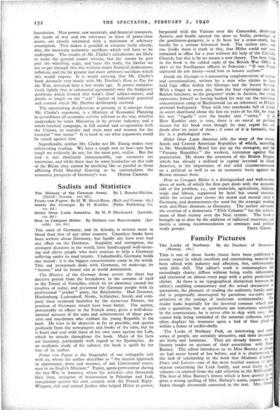Sadists and Statistics
The History of the German Army. By J. Benoist-Mechin. (Zurich : Scienta. los. 6d.) How to Conquer Hitler. By Hellmut von Rauschenplat. (Jar- _ rolds. los. 6d.)
THE story of Germany, and its history, is written more in blood than that of any other country. Countless books have been written about Germany, but hardly any have ever had any effect on the Germans. Stupidity and corruption, the
strongest dictators in the world, have handicapped well-mean- ing and clever people who were anxious to help a Germany suffering under its mad tyrants. Undoubtedly, Germany holds one record: it is the biggest concentration camp in the world. This sad pentateuch deals with Germany, its make-up, its "heroes," and its brutal aim at world domination.
The History of the German Army covers the short but decisive period from the breakdown in the autumn of 1918 to the Treaty of Versailles, which by its clemency caused the troubles of today, and presented the German people with its professional " pocket " army, the Reichswehr. Had Groener, Hindenburg, Ludendorff, Noske, Schleicher, Seeckt and com- pany been rendered harmless by the victorious Powers, the position of Germany would have been better. The author, presumably an officer in the French army, gives a well-docu- mented account of the aims and achievements of these para- sites and murderers who stabbed the young Republic in the back. He tries to be objective as far as possible, and quotes profusely from the newspapers and books of the time, but he is heart and soul with those of his own caste against the Left, which he attacks throughout the book. Many of his facts are incorrect, particularly with regard to the Spartacists. As an academic study of his subject, the book is spoilt by the bias of its author.
Franz von Papen is the biography of one unhappily still with us, whom the author describes as "the nearest approach in appearance, dress and manner, of any Continental states- man to an English Minister." Papen, agent-provocateur during the last War in America, where his activities cost thousands their lives, instigator of insurrection in Palestine and Irak, conspirator against his own country with the French Right- Wingers, rich and cynical Junker who helped Hitler to power,
bargained with the Vatican over the Concordat, destroyed Austria, and finally opened the door to Stalin, prototype of the gentleman-gangster, is a fit hero for a crime-story, but hardly for a serious historical book. The author says, and one thinks there is truth in this, that Hitler could not have remained in office for a year without the help of the Catholic Church, but this is by no means a new theory. The best thing in the book is the cabled reply of the British War Office in 1917 to the Intelligence officers in Palestine : "If von Papen captured do not intern—send him to lunatic asylum."
Inside the Gestapo is a nauseating conglomeration of sadism and sensationalism, written by a man who claims to have held high office within the Gestapo and the Secret Service. With a finger in every pie, from the Saar espionage and the Roelun butchery, to the gangsters' tricks in Austria, the writer represents himself as having hacked his way via the notorious concentration camp of Buchenwald (as an informer) to Hitler's personal bodyguard. Then with two notebooks full of details in secret shorthand about the last six years of his life, he made his way " legally " over the border into "safety." If all Herr Koehkr says is true, there is no moral or political excuse for his book even though he may regret his evil deeds after six years of them ; if some of it is fantastic, then his is a pathological case.
Hitler Over Latin America tells the story of the twenty South and Central American Republics of which, according to Mr. Macdonald, Brazil has put up the .strongest, and the "Panama Republics" the weakest, resistance against Nazi penetration. He draws the attention of the British Empire, which has already a milliard in capital invested in South America, to the importance of real solid counter-measures on a political as well as on an economic basis against the Brown menace there.
How to Conquer Hitler is a distinguished and well-written piece of work, of which the first part deals with the economic side of the problem, i.e., raw materials, agriculture, industry,
trade and labour, supported by brief but sound statistics, while the second part shows the moral and mental state of
Germany, and demonstrates the need for the strategic working
with anti-Nazi elements in Germany. The author advocates the creation of a democratic "Fifth Column" for the achieve- ment of final victory over the Nazi system. The book is brought up to date by the addition of italicised insertions, and merits a strong recommendation to seminars and political






































 Previous page
Previous page